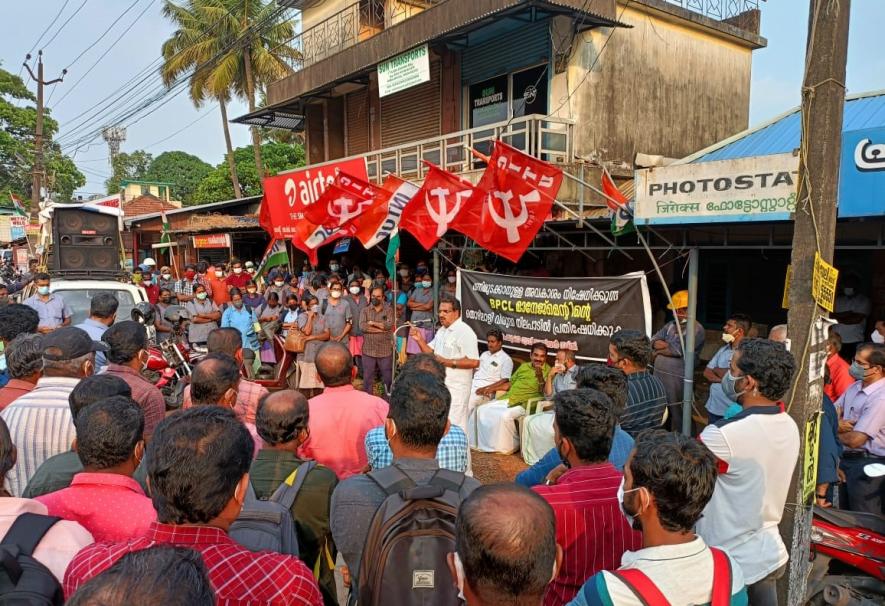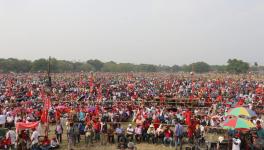Kerala High Court Order Banning BPCL Workers’ Participation in General Strike Draws Flak

Trade Unions Joint Council's protest at BPCL against threats of penal wage cut.
Following a Kerala High Court order restraining workers’ unions in Cochin Refinery, Bharat Petroleum Corporation Ltd (BPCL), going for a strike on March 28 and 29, the Centre of Indian Trade Unions released a statement on Saturday registering its protest. The statement called the High Court order ‘blatant’ and appealed to the court to recede the order.
The call for the strike to be observed on March 28 and 29 was given at the National Convention held on November 11, 2021, in New Delhi, which was organised by the 10 Central Trade Unions (CTUs) and scores of industrial or sectoral federations and associations – with aim to stand against the anti-people and anti-worker policies of the central government.
The statement by the CITU read: “The Court has passed such blatant order which virtually banned the strike in the wake of the petitions filed by the BPCL, Cochin Refinery which unfortunately took shelter in the section 22 (d) of Industrial Dispute Act that prohibits strike or lock-out during the pendency of the conciliation proceedings. It is an irony that strike demands have nothing to do with petitioner – company to conciliate rather the demands are more connected to the anti-national policies of the Central government to sell off all the Public Sector Enterprises like BPCL to the private in utter disregard to the public interest.”
In this regard, Aji MG, general secretary of BPCL Workers Association (affiliated to CITU), told NewsClick: "We put forward the 12-point charter of demands for the central government, not the BPCL management. But, now the management approached the court and technically got the judgement against the participation of BPCL workers in the general strike. Suppose we have a wage settlement issue, and the negotiation talks are on. If we go for a strike at that stage, then such judgements make sense. Now, the trade unions are striking against privatisation, labour codes, and others. So the judgement is technically right, but logically, it isn’t.”
“If we come to the case of BPCL, we had observed a strike on September 7 and 8 in 2021. It was for the wage settlement issues within the BPCL. The wage revision period of the BPCL had ended on July 31, 2018. Except for the BPCL employees, all other public oil companies have revised their wages. Even the officers in BPCL were given the wage revision,” he added,
He further explained that the management had proposed a wage agreement with a three-yearly revision clause, which is a subject of contention. The long-term wage agreement proposed by the management called for a three-yearly review of salaries. As the BPCL is all set to go to private entities, there are worries that the new promoter (whoever it may be) would soon move to lower wages.
CITU state president Anathalavattam Anandan, in a statement, said he did not understand that under which law the High Court had banned workers’ strike at the Kochi refinery. “Workers have the right to strike as well as to work. The law allows a registered trade union to strike, serving notice before 14 days,” he pointed out.
“The Constitution grants democratic rights to protest against the policies of the state. The workers are asserting their rights. The court, however, did not utter a single word about the sale of national assets that were built with the sweat and blood of workers. Instead, a court taking a stand against workers who claim to protect the country's wealth and the democratic and labour rights of the people is not an adornment in a democracy,” he added.
Responding to workers’ general strike notice, the BPCL management had issued an order which warned the workers with an eight-day penal wage cut, to restrain them from the general strike. This means that workers would suffer an 18 day wage loss, if they participate in the two-day strike.
The Trade Union Joint Council conducted a protest at BPCL on Saturday against the management’s attempt to restrain the workers from the General Strike. Trade Union leaders said the workers would participate in the two-day strike, despite the threats. The management would have to face serious repercussions if the workers are penalised more than the wages for the two days of strike, said the joint trade union leaders.
Cochin Refinery Protection Council, an initiative which includes BPCL workers and the public, had earlier decided to observe a district hartal on 21 March against the privatisation of BPCL. The hartal was later called off after the central trade unions announced the two-day general strike on March 28 and 29.
Get the latest reports & analysis with people's perspective on Protests, movements & deep analytical videos, discussions of the current affairs in your Telegram app. Subscribe to NewsClick's Telegram channel & get Real-Time updates on stories, as they get published on our website.
























